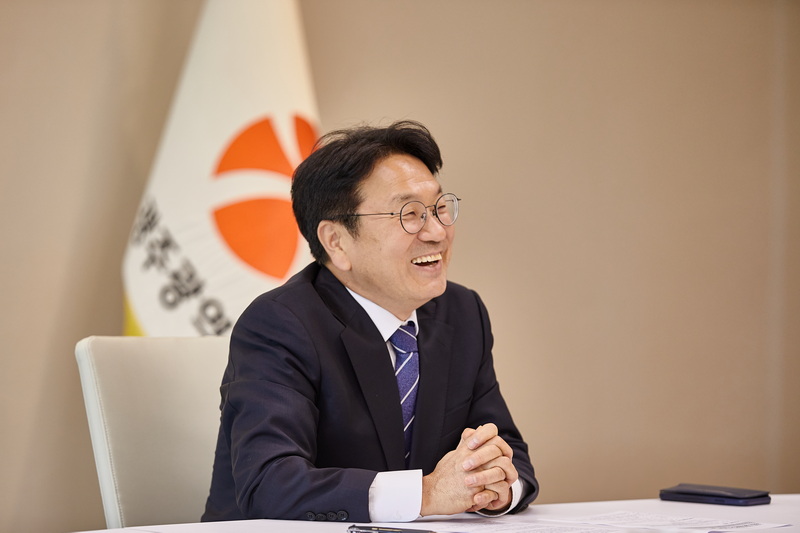Gwangju Mayor for Tomorrow: An Exclusive Interview with the Hon. Kang Gi-Jung
Born in Goheung, Jeollanam-do, on December 3, 1964, Mayor Kang Gi-Jung may be new to the mayor’s office in City Hall, but he is not new to politics. He first served as a National Assembly member in 2004. Prior to becoming mayor, he served as the chief of political affairs during former president Moon Jae-in’s administration.
Mayor Kang’s economic map, which will include new growth for five new economic districts: the automotive, AI, next-generation battery, digital precision medicine, and MICE industries, hopes to make Gwangju a strong city that can lead in the industries of tomorrow. He wants his administration to be a creative one through which Gwangju can provide more opportunities to its citizens to grow and develop for their “tomorrow.” With these visions in mind, the Gwangju News was keen to meet with the mayor and sit down to ask him about additional plans he might have for the “City of Light.” Here is our recent interview with him. — Eds.
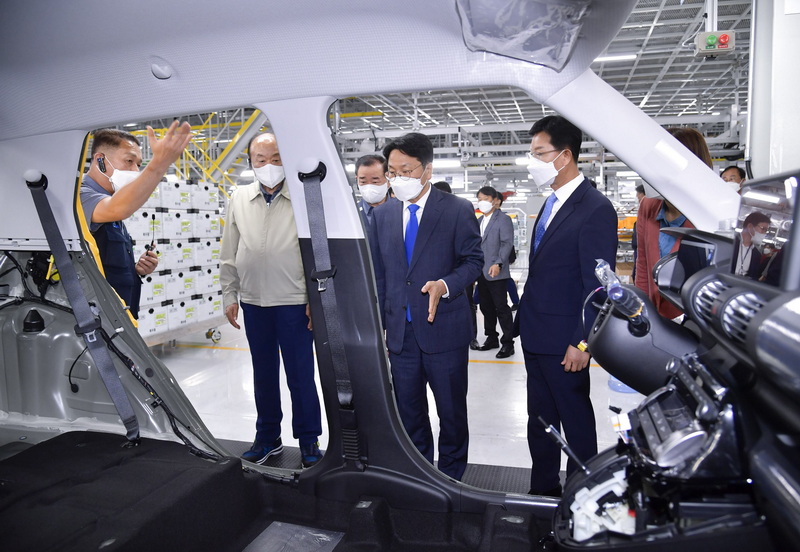
Gwangju News (GN): Thank you so much for accepting our proposal for an interview. It is an honor for us to meet with you. Please accept our warmest congratulations and best wishes for your success in office. I think that Gwangju citizens as well as the international community residing in Gwangju are well aware that you have served as a chief of political affairs in the Moon Jae-in administration. For the readers of the Gwangju News, please tell us a little more about yourself.
Kang Gi-Jung: I am a typical member of the “386 Generation” in Korea. The “386 Generation” is made up of those born in the 1960s who attended university in the 1980s. They have continued to resist the hegemony of the United States, promote investigation of the truth behind the 5.18 Democratization Movement, and seek punishment for those responsible, such as Chun Doo-hwan and Roh Tae-woo, which I did for my full four years of university life. When I was a sophomore in high school, the 5.18 Democratization Movement took place, and Daedong High School, which I attended, was the first school in the country to be closed by the government. I went through the turmoil in May 1980, and after that, I entered Chonnam National University and protested throughout my school days. I participated in the struggle to punish those responsible for the 5.18 Democratization Movement and for that, I spent three years and seven months in prison. Then, I started to get into politics because I wanted to reform Korean politics. I served in the National Assembly for 12 years, and after serving as the chief of political affairs at the Blue House for a year and eight months, I became the mayor of Gwangju.
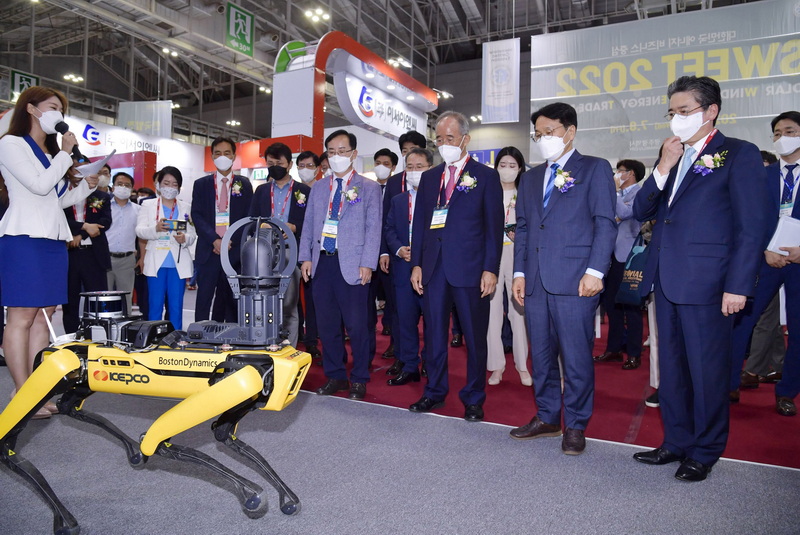
In my 20s, I was a pro-democracy activist who fought for the punishment of those responsible for May 18, and in my 40s, I worked in the National Assembly for political reform. Following that, I thought I should become mayor to meet the public’s desire for rapid change in Gwangju.
The 1980s were the era of a generation that desperately needed democracy because the military dictatorship of Chun Doo-hwan was suppressing our society. Just as the military came to power and caused the May 18 Uprising in 1980, it was a dark period in which the seeds of tacit democracy did not grow in our entire society. We had the democratization movement in that dark period, and at the forefront of it, the citizens of Gwangju, and those who longed and hoped for democracy all over the country, helped the buds of democracy blossom one by one. Based on that, the foundation of the present democracy in Korea was laid, and as a result, the semiconductor, automobile, and bio-medical industries were built, making Korea the culture and IT powerhouse it is today. So, I believe that without the democracy movement of the 1980s as a foundation, neither industry nor culture would have prospered, and the IT industry in Korea would not have been able to grow. But it has grown because the government of former President Kim Dae-jung provided the people with a new daily tool – the internet – and aimed for a creative nation of culture. In the 1970s, the Park Chung-hee government revitalized the export-led industry and developed this mainly in the Yeongnam (Gyeongsangbuk-do and Gyeongsangnam-do) regions. As a result, the Honam (Jeollabuk-do and Jeollanam-do) region remained engaged in only agriculture and fell behind in the tertiary service industry.
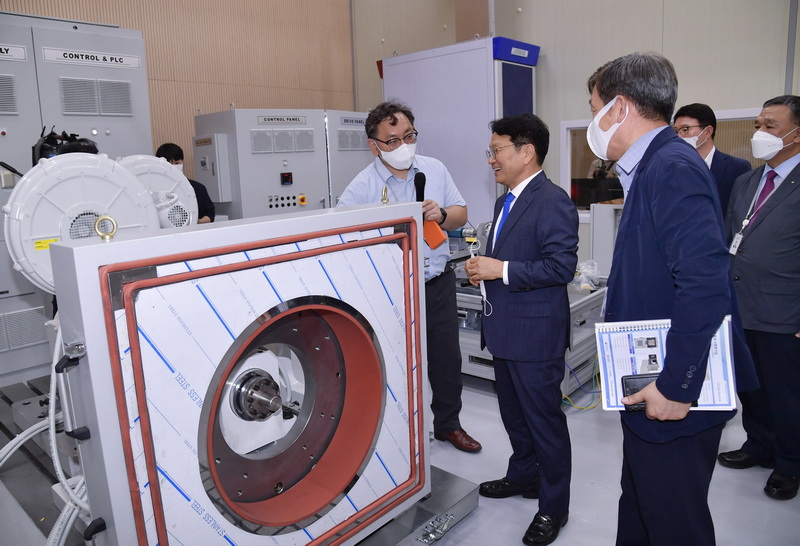
GN: You were deeply motivated to become the mayor of Gwangju, where you spent your school days, and where you experienced history in the making. The new Gwangju slogan of the eighth administration is “Gwangju, City of Opportunities, Where Your Future Shines” (광주, 내*일이 빛나는 기회 도시). What does the slogan mean, and what plans do you have to move Gwangju toward a shining tomorrow?
Kang Gi-Jung: A Gwangju with many opportunities, a city with many jobs, a city where you can enjoy yourself, a city where you can get married and raise your children in safety – I hope Gwangju can become a city of opportunity like this. For a long time, we in Gwangju have lived a difficult life on the treadmill of history, fighting for democracy, so we have been behind in matters of individual rights and enjoyment, family happiness, and economic wealth. These days, we are the only city with no large shopping mall complex. There has been no opportunity to realize dreams and hopes, and we were called a “boring”
(노잼 “no-jaem”) city. So, let us make a city for “nae–il” This can mean “my job” (내 일, nae il), or “tomorrow” (내일, naeil), or the tomorrow of a near future. So, I made the slogan “Gwangju, where tomorrow is shining,” or interpreted the other way, “Gwangju, where my work shines” with the intention of making Gwangju a city where job opportunities abound, and the future is bright.
GN: Gwangju’s previous administration focused on responding to the COVID-19 pandemic. What do you think is now the main challenge facing Gwangju from the coronavirus, and what plans do you have to solve those issues?
Kang Gi-Jung: From January 2019, I worked at the Blue House for one year and eight months, helping President Moon Jae-in as the chief of political affairs. The COVID-19 crisis broke out at the end of December 2019. From then on, there was an emergency at the Blue House – the control tower of our safety – and, of course, at that time, I did not know that the pandemic would last this long.
High interest rates and high inflation were the biggest problems, which made the people’s livelihoods quite difficult. Second, it was really difficult for small and medium-sized businesses to do business because of high interest rates. There was a plan to implement a policy guaranteeing small business owners about a two-percent interest rate, along with support for reductions, though this has become difficult due to a further rise in interest rates. There is one more policy worth mentioning: The Win-Win Card was suspended due to budgetary constraints. The budget of the Ministry of Economy and Finance has been suspended, and the Gwangju City budget has been suspended since June, but I will revive it. I will bring these back to life in Gwangju through a supplementary budget. In the end, we will do our best during the first 100 days by operating the People’s Livelihood Countermeasures Headquarters because the fundamentals of freezing utility bills, supporting interest rates, and reviving the Win-Win Card are difficult. And as the importance of public healthcare has grown since the outbreak of the pandemic, a public medical center should be established in Gwangju. I think that there will be no great risk if we take good preventive measures and create an infectious disease response manual, and then implement a response to any arising issues based on the manual.
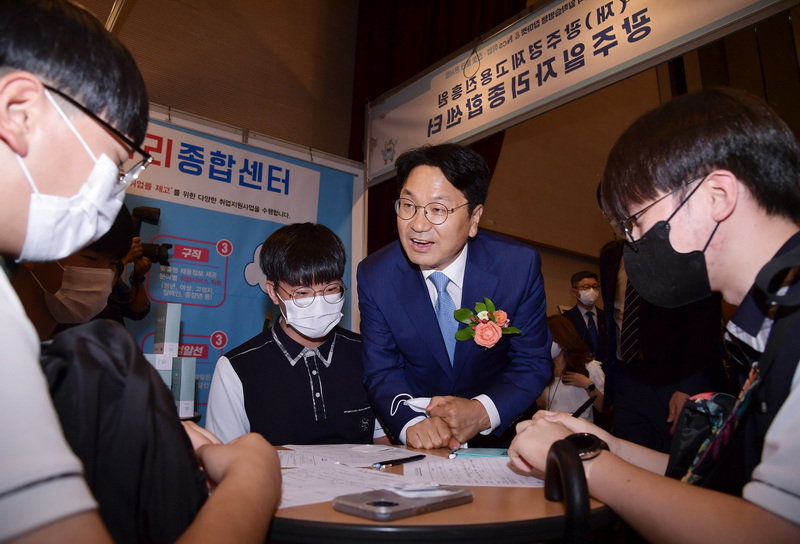
GN: As you mentioned earlier, the city is promoting as its main industries semiconductors, next-generation batteries, autonomous vehicles, the precision medical industry, and the international MICE industry. We would like to know what direction the implementation will take during your administration.
Kang Gi-Jung: We have so many action plans, I do not know where to begin, but I first made a promise to draw a new economic map of Gwangju. Currently, Gwangju’s industry is very weak, with only 14 companies employing more than 300 people. So, we promise to create a lot of jobs by growing and expanding these industries.
These key local industries – semiconductors, next-generation batteries, autonomous vehicles, precision medicine, and international MICE – constitute the “Gwangju New Economy Map,” represented by five new industrial districts and five new special vitality zones. Eleven strategic industries, including the kimchi industry, are being adopted, and two more industries, a semiconductor production complex and a next-generation battery complex, will be added to draw a new economic map for Gwangju so that industry can thrive. In particular, the industry that President Yoon Seok-Yeol’s administration wants to expand the most is the semiconductor industry, which is important not only for Korea but also for Gwangju. Therefore, Gwangju and Jeonnam are jointly promoting the creation of a semiconductor production complex as a strategic industry. Also, in the organizational restructuring, we will create a department in charge of start-ups for better start-up promotion, create a 500-billion-won fund, and create an investment institution to revitalize start-ups and create a more interesting and vibrant industrial city.
GN: According to data from the Ministry of the Interior and Safety, there are about 40,000 foreigners living in Gwangju, which makes up 2.8 percent of the total number of Gwangju residents. The annual Gwangju Chungjang Festival is expected make 2022 a year of leaps and bounds as it expands into the upcoming Gwangju Chungjang World Festival. And various policies concerning immigrants are also being discussed. What is your view of the “Gwangju as a Global City” idea, and do you have any ideas on policies or measures for various foreign residents and communities living in Gwangju?
Kang Gi-Jung: I think that Gwangju is a competitive city only when it literally becomes an inclusive and global city. To do this, physically, it must become a gateway city, and as the airport is open and accessibility is close, many people can come to Gwangju. That is why it is important to create a gateway to Gwangju through its airport.
You said that there are 40,000 foreigners living in Gwangju. In fact, we had a small team (within City Hall) called the Migrant Support Team, but recently, I have thought to change it into the International Cooperation Team and the Foreign Support Team, and establish more full-fledged measures for foreigners living abroad and in Gwangju.
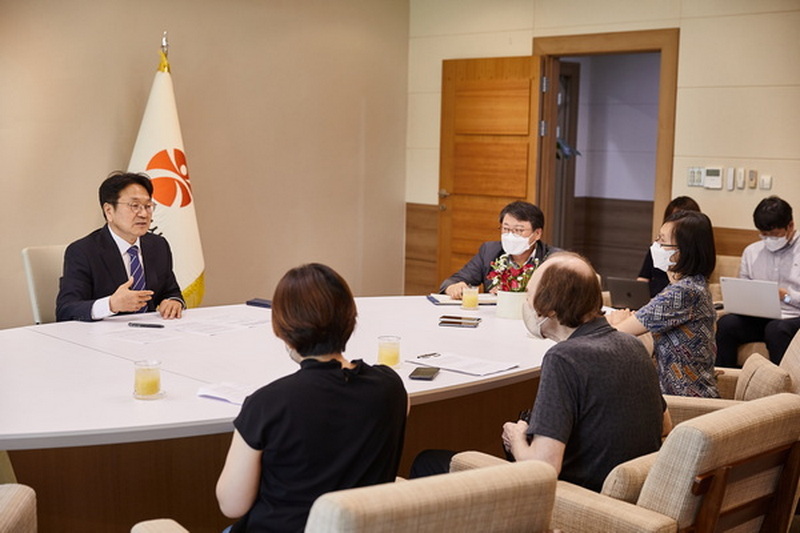
In particular, in order to help foreigners settle in Gwangju, the city has 39 ongoing projects, especially in Gwangsan-gu, but a total of 69 projects – the largest number ever – are to be carried out, and I know that the Gwangju International Center has been entrusted with a large number of them.
So, first of all, in order to transform and create a more global society in Gwangju, we will start to raise interest by making some changes to the city’s organization, and secondly, we are going to diversify our businesses. We believe that a culture of inclusiveness and diversity can be created only if public officials acquire a sensitivity to cultural diversity by increasing overseas education and training opportunities for public officials and expanding relevant overseas-training institutions. It is important to host international events as an indicator to measure whether a particular city is an international one, but Gwangju citizens can measure how many foreign friends they have, whether they have invited foreign friends to their homes, and how high the ratio of international students at universities is. To this end, I am trying to establish a “glocalization” measurement index for Gwangju.
Another thing is that I would like to promote Gwangju as a global city of culture and human rights by inviting diplomatic delegations to Korea on May 21 for Gwangju Citizens’ Day, and also for the Biennale and the World Human Rights Cities Forum. So, I would be grateful if the Gwangju International Center could give us ideas on international exchange policy for Gwangju City with its know-how and experience.
GN: Mr. Mayor, what else would you like for our Gwangju News readers to know about you?
Kang Gi-Jung: I hope is for Gwangju to become a more inclusive and diverse city. Based on the values and identity of Gwangju, such as democracy, human rights, and culture, I want to create a city where people can open their hearts and have more exchanges among citizens and foreigners, mix cultures and knowledge, and fuse cultures and industry. I will do my best to help realize such a city, and I would be grateful if you would work hard at the GIC and the Gwangju News, and if the foreigner community would actively participate together.
GN: Thank you, Mr. Mayor, for this insight into your life and your plans for Gwangju during your tenure as mayor to make for Gwangju a better tomorrow.
Interview by Dr. David Shaffer and Karina Prananto
Special thanks to Kim Minsu for the translation.
Photographs courtesy of Gwangju Metropolitan City Hall.



